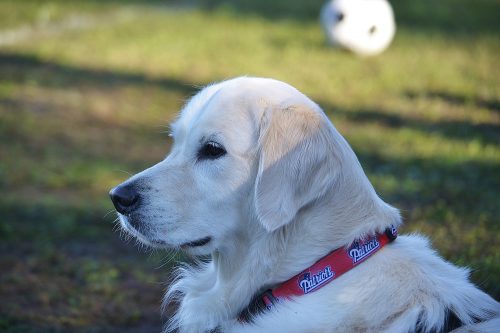Finding out your canine companion has cancer is a difficult concept to process. Unfortunately, cancer is the leading cause of death in dogs over the age of two, so it is important to stay educated on the subject. There are probably a myriad of questions coming to mind including: what causes cancer in dogs? By understanding what causes cancer in dogs, the treatment and coping process may become easier to grasp.
There are many forms of cancer that could impact your dog, and each develops slightly differently once it starts growing. However, similar to cancer that impacts humans, cancer forms when there is damaged DNA that leads to abnormal cell growth. These abnormal cells grow uncontrollably, forming cancerous tumors.
If caught in the early phases, these tumors can be removed before they impact the healthy parts of the body. However, many times the cancer goes unnoticed and spreads to other body parts, making recovery more difficult. Since cancer impacts dogs in a very similar way that it impacts humans and other animals, there is not one clear culprit. The definite cause of cancer in dogs is still somewhat a mystery, but with research, we can try our best to understand this disease that impacts so many creatures.
Why Do Dogs Get Cancer?
Old Age
A common cause of death people often refer to is “old age,” but old age could also be a factor that causes cancer. Although there is not one clear cause of cancer in dogs, statistics show that with age, the chance of cancer increases as well. Research is inconclusive, but evidence suggests that as the body ages, so does the efficiency of the immune system.
A weak immune system is more likely to produce a mutated cell when it splits, leading to the uncontrollable growth. Additionally, there are damaging environmental elements that are linked to cancer, and the longer dogs live, the higher the chance that they will be exposed to one of more of these harmful materials.
Environmental Elements
It seems nowadays that everything can cause cancer. From cleaning products to cosmetics, appliances we use to building materials, it seems that everyday there is a new cancer warning on a household item. As domesticated animals, dogs live in the same environment we do and are therefore exposed to the same elements.
Research shows that there are carcinogens that are directly linked to cancer. If you are a smoker or live in a house with a smoker, the second hand smoke also impacts your pets. Similarly, smog and air pollution can impact your furry friend the same way it affects people. Another common cause of cancer that can reach your dog is ultraviolet radiation.
Additionally, there are a number of chemicals used in landscaping and agriculture such as pesticides, herbicides, and insecticides that contain carcinogens that are linked to cancer. A number of common substances such as asbestos, benzene, benzidene, cadmium, nickel, radon, uranium, and vinyl chloride are also associated with causing cancer, which can reach your pet in the same way they reach humans.
Genetics
While all dogs are at risk for developing cancer, trends among dog breeds suggest there is a level of genetics that determines if a dog will get cancer or not. Some dog breeds are more susceptible to cancer, indicating hereditary influence. Of course, age and environmental factors could still reach your dog; however, if there is a history of cancer in the dog’s lineage, it will also increase their chances.
Large breeds of dogs such as Golden Retrievers, German Shepherds, Boxers, Scottish Terriers, Great Danes, Bulldogs, Newfoundlands, and other large or giant breeds are more commonly impacted by cancer. Similarly, a dog’s physical make up could influence their chance of getting cancer. For example, dogs with light colored or thin coats are at higher risk to develop mast cell tumors.
Hopefully one day scientists will be able to pinpoint the cause of cancer, and even more importantly a reliable cure. However, at this point in research, pet owners can only do the best they can to keep their dogs as happy and healthy as possible.
Even though there is no fail-safe way to keep your dog from getting cancer, some ways to help decrease the risk of cancer in your dog include avoiding all known carcinogens, having your dog spayed or neutered, and ensuring that they have proper diet and exercise. Keep a watchful eye on your dog’s behaviors and do your best to keep them on a healthy routine to reduce the risks of cancer.






